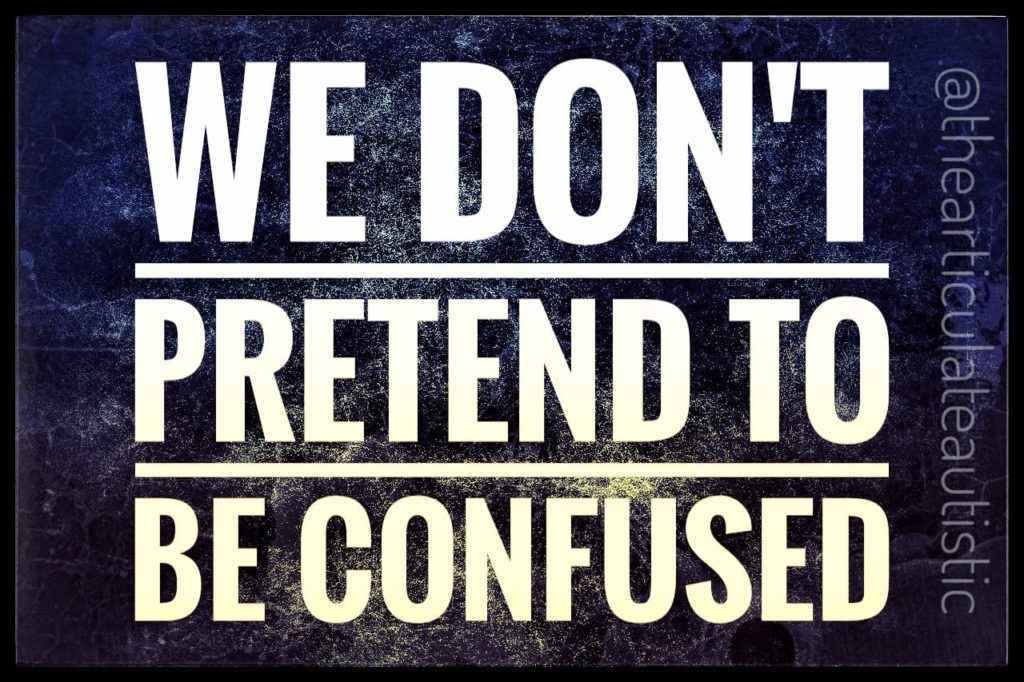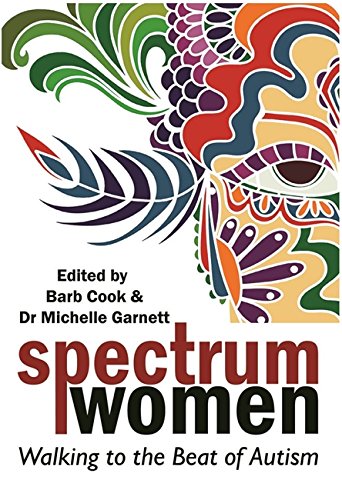We Don’t Pretend to Be Confused

This is one of those things I found out about the difference between neurotypical behavior and autistic behavior that felt like a punch to the gut.
Apparently, in neurotypical society, showing confusion and asking questions has TWO meanings:
1) Genuine confusion and an attempt to understand and do better.
2) Trying to get out of a situation or project.
As an autistic person, the only meaning confusion has for me is confusion. I have never put on an act of not understanding something to get out of doing it. Never. I can’t even imagine that because for me, confusion is one of the most anxiety-producing feelings in the world.
– Jaime A. Heidel
I hate being confused, but I am at least once every day about something.
If an autistic person asks questions and it seems like a lot, or the questions are repetitive, you might look for a hidden motivation. Resist the urge.
There is no hidden motivation.
(Article continues below.)
The best way to improve communication with your autistic loved one is to understand how your autistic loved one’s mind works! Intentions, motivations, and personal expressions (facial expressions or lack thereof, body language, etc.), are often quite different in autistic people than they are in neurotypical people.
Experience a better understanding of your autistic loved one by reading books about life from an autistic perspective as well as stories that feature autistic characters. You’ll have so many “Ah ha!” moments and start seeing your autistic loved one in a different light (and you’ll have a better understanding of their behaviors, which you may have been misinterpreting up until now).
Books I recommend for a better understanding of your autistic loved one:
We just (sometimes desperately) want to understand and get on the same page with everyone else as quickly as possible so that we can stop drawing unwanted attention to ourselves.
If you’re on the spectrum, and you’re not quite buying the whole “NTs use a show of confusion to get out of doing something” claim, I have heard NT people boldly state that they have done a poor job of a chore ON PURPOSE so they didn’t have to do said chore again and their partner would just take over.
“You’re just pretending to be bad at this” is not a sentence autistic people can easily make sense out of. No, we don’t. That’s just our neurology. We don’t pretend to be confused any more than we use emotions to manipulate others.
Most of us hate being confused, so if we are telling we still don’t understand or we appear to be picking apart every word you say while simultaneously appearing rude and maybe talking louder and more animatedly, take us at face value and do your best to accommodate us ASAP because, at that point, we’re probably panicking.
If you can’t because you’re on a deadline, let us walk away with a promise that you will try again to show us what you mean when you have the time and patience to do so, or you’ll get someone else to.
We’re not pretending, we’re sinking, and we need you to throw us a life raft!
Follow me on Instagram.
Want downloadable, PDF-format copies of these blog posts to print and use with your loved ones or small class? Click here to become a Patreon supporter!







2 Responses
[…] Does your autistic loved one appear to often be confused? It’s not an act! Click on the photo to learn more about why autistic people can be very confused in a neurotypical world. […]
[…] more importantly than anything else, BELIEVE US. We do not pretend to be confused. In fact, it’s often the exact […]